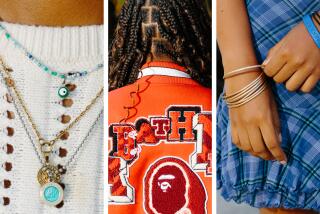Answers go begging for questions at his old high school’s Career Day
Belmont High School isn’t the same as it was when it threw me out into a depressed world in the spring of 1934.
I drove up to the old Alma Mater the other morning to take part in its annual Career Day, and I was impressed.
It looked like a battleship dressed up for an admiral’s inspection.
Everything was clean and polished. ROTC cadets in uniform stood at every corner. Girls waited to meet the guests and lead them to the library for registration, coffee and pastries.
The main hall was decorated with exciting murals painted by the students. They were in various styles: landscapes, abstracts, flowers, people, a magnificent view of the city contrasting old Victorian houses with the downtown skyline. They were bursting with talent and skill. I know of no other civic building whose murals are more dramatic and indigenous.
I looked into the cafeteria as we passed. It too was decorated. Even the pillars were covered with flowers and neat rows of Oriental characters.
We gathered in the library--men and women from almost every legitimate walk of life: advertising, photography, carpentry, architecture, medicine, the military, law, travel, police work, auto mechanics and culinary arts. I was to speak to two classes on journalism. Our ID pins were waiting for us.
When the bell rang we went our separate ways, each led by a girl student.
I found myself standing in front of a class that looked as if all had come from Latin or Asian countries. They seemed to regard me politely, but without enthusiasm.
I began telling them what a wonderful profession mine is. Their eyes were on me, but I did not seem to have their minds. I tried telling one or two of my funny stories. In nearly half a century of journalism I have collected some funny stories. I got one or two tentative smiles; no laughs.
I tried drama. I told them about the night I talked with Robert Kennedy in the Ambassador Hotel just before he went downstairs to his assassination. No reaction. I realized they might never have heard of Robert Kennedy.
I began to wonder if they understood me. I wondered why they had chosen journalism as the career they wanted to hear about. I asked if they had any questions. No questions.
When the bell rang I told the teacher, “I’m not sure I was reaching them.”
“They were probably mostly ESL students,” she said, meaning English as a Second Language. “But believe me. I know them. They were listening. They respond inwardly.”
Between the sessions we went back to the library for an excellent brunch that had been set out on tables. The principal, John Howard, thanked us all for being there and said a few words about Belmont.
It is the largest school in the Los Angeles Unified School District, with 4,500 students; another 3,000 students in the attendance district are bused to other schools. Belmont students come from 55 countries and speak 34 languages or dialects.
That is the inner city.
“For the past five years,” the principal added earnestly, “it has had the largest number of state and major college scholarships of any high school in California. The image of education is poor; the reality is much better. These students are upwardly mobile. They have a tremendous hustle and ambition to make something of themselves. The know the future belongs to the competent. The stereotype of our inner city schools has been changed.”
When I went back to face the second class I tried harder. I knew they were trying to understand how what I was saying might help them.
I was determined to make them ask some questions. I pointed out that the first requirement of a good reporter was curiosity. An inquisitive mind. A good reporter thought up questions and he was not intimidated by anyone. He asked the President of the United States what he was doing in Nicaragua. And he expected an answer. That was what our free press did in America. It asked questions. It made the leaders of the country accountable to us, the people.
I knew they were listening. Perhaps they could understand that. The meaning of a free press.
When I was finished they began to ask questions. How did one get a start? Was it worth while going to college? What was the difference between a reporter and a journalist? (Nothing, I said, but the reporter’s image of himself.)
Finally one asked, “How much money do you make?”
I knew I had got through to them.
Whether I helped them at all I don’t know; but I must say they were the most exquisitely polite group of teen-agers I have ever talked to.
Afterwards a woman told me she was doing a book about Crown Hill. That is the hill, about half a mile due west of City Hall, on which Belmont stands. When I went to Belmont it was a good middle-class and upper-middle-class neighborhood. There are still some old and well-kept houses, but it is overcrowded; it has gone downhill. The apartment I lived in has become a slum, barred and paranoid.
“What would you call Crown Hill today?” the woman asked me.
“I’d call it an island of refugees,” I said.
“Was it called Crown Hill when you went to school here?” she asked.
“Oh, yes,” I said, and I sang the first line of our Alma Mater:
There’s a school of beauty rare upon the old Crown Hill . . . .
She was impressed.
More to Read
Sign up for Essential California
The most important California stories and recommendations in your inbox every morning.
You may occasionally receive promotional content from the Los Angeles Times.










